National
Paudel caps his career with presidency
Ram Chandra Paudel is elected President of Nepal, after Ram Baran Yadav and Bidya Devi Bhandari. Paudel first won the House seat in 1991 and became the Speaker in 1994. He served as minister several times.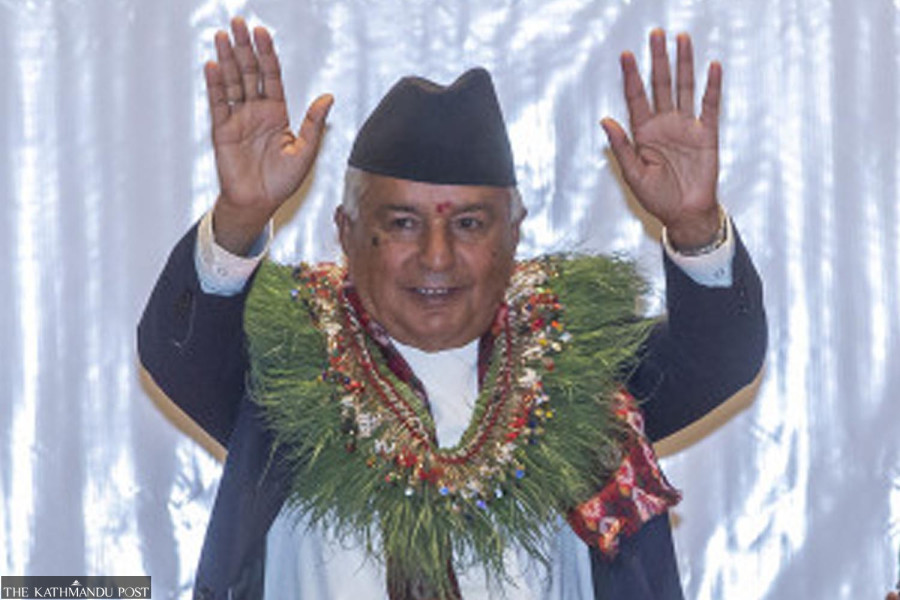
Nishan Khatiwada
Federal and provincial lawmakers voted Ram Chandra Paudel, a senior leader of Nepali Congress, as the country’s third President on Thursday.
Backed by 10 parties, the Congress veteran garnered over 64 percent of the votes while his rival Subas Chandra Nembang of CPN-UML got around 29 percent.
Out of 52,628 weightage-based votes, Paudel secured 33,802 while Nembang got 15,518 votes.
Election officer Mahesh Sharma Paudel said the votes cast by five of the 831 federal and provincial lawmakers were invalid. A total of 312 votes from the federal lawmakers and 514 votes from the provincial assembly members were valid.
Of the 881 federal and provincial lawmakers who were eligible to vote, 831 participated in the election on Thursday.
According to Amrita Bhandari, assistant election officer of the President and Vice-president election office, 313 federal lawmakers and 518 provincial assembly members cast their votes.
Earlier, a breakup of the alliance between the UML, the second-largest party, and the Maoist Centre, the third biggest, had laid the ground for Paudel’s election. Maoist Centre chief Pushpa Kamal Dahal became prime minister on December 25 with the UML backing. In return, the Maoist Centre was to help elect a UML nominee as President.
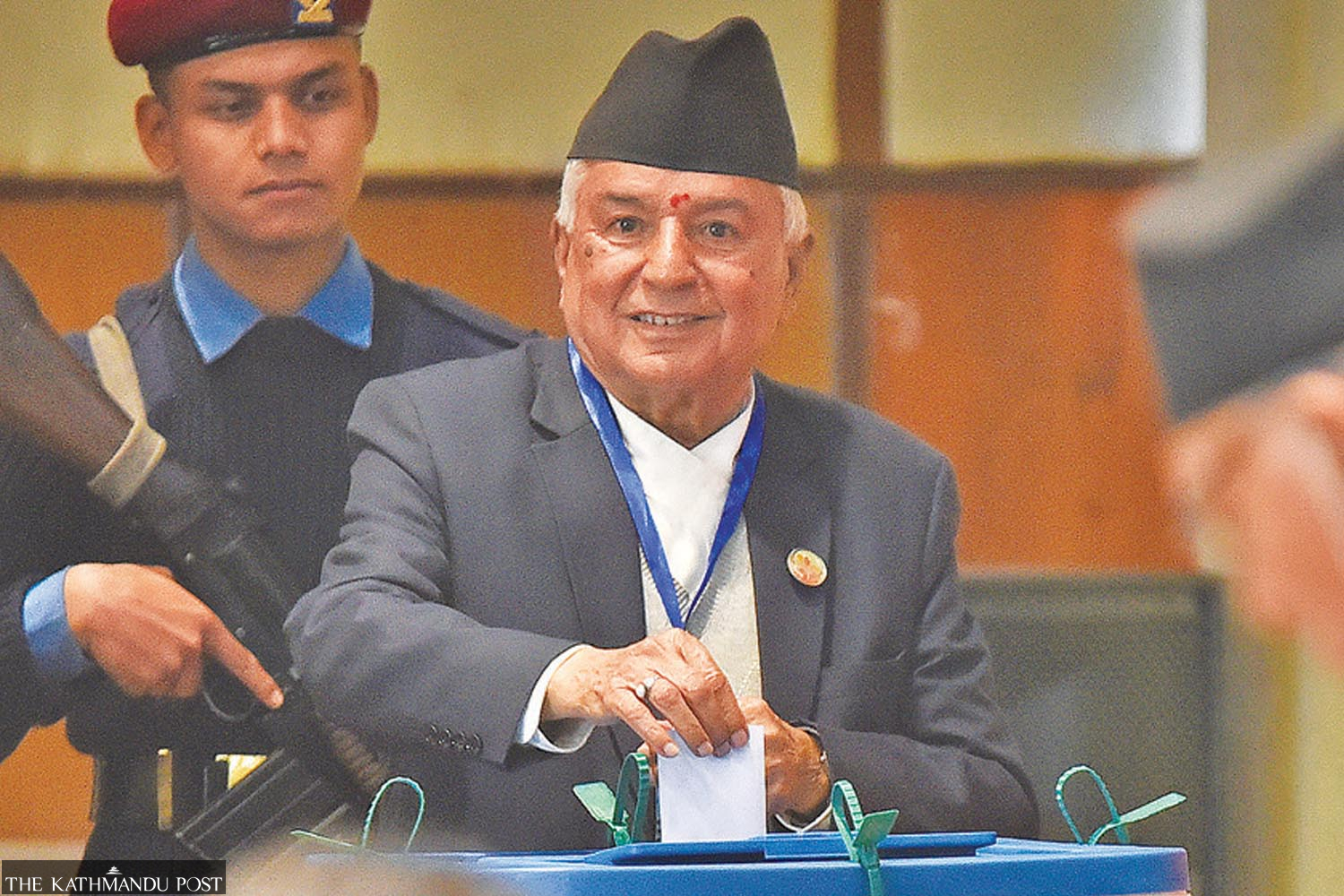
But Dahal refused to honor the agreement after the Nepali Congress, the largest party, gave him a vote of confidence on January 10. After the Maoist Centre decided to partner with the Congress in the presidential election, the UML pulled out from the government on February 27.
Among federal lawmakers, all 14 from the Rastriya Prajatantra Party and Nepal Majdoor Kishaan Party’s only lawmaker (Prem Suwal) skipped the vote.
CPN (Maoist Centre) lawmaker Barshaman Pun and Nepali Congress’ Chandra Bhandari could not vote as they are in China and India, respectively, for medical treatment.
Likewise, UML’s Laxmi Koiri, who is on the run on the charge of killing a policeman, was also absent.
The Electoral College comprising the members of the House of Representatives, National Assembly and seven provincial assemblies voted to elect the head of state.
The vote weightage of a member of federal parliament is 79 while it is 48 for a provincial assembly member.
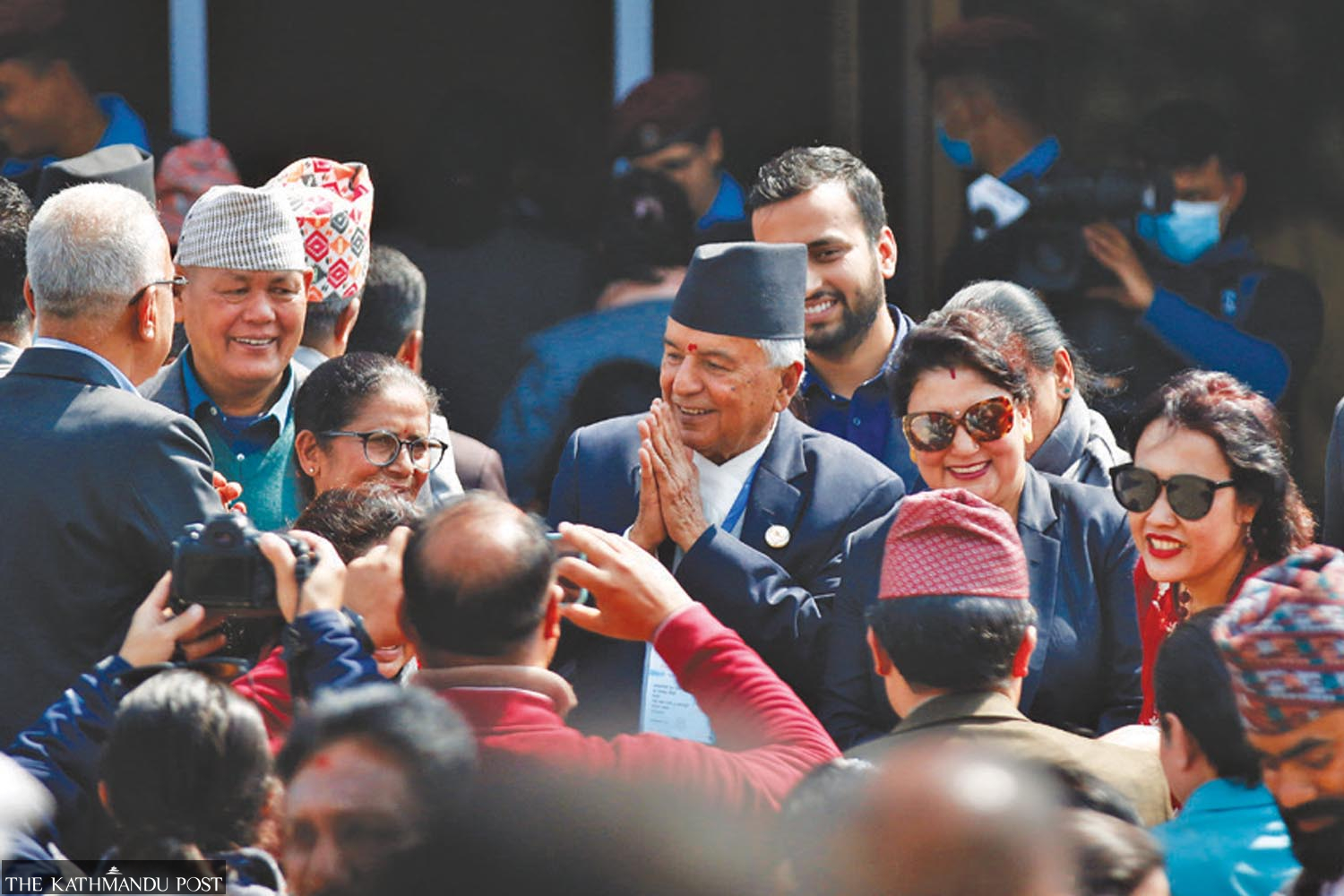
Among provincial lawmakers, 28 belonging to the Rastriya Prajatantra Party and three from the Nepal Majdoor Kishan Party abstained from voting.
Similarly, Bindu Yadav, Madhesh provincial assembly lawmaker from Janata Samajbadi Party, was also absent.
The term of the outgoing president Bidya Devi Bhandari ends on March 12.
Paudel is expected to assume office on Monday after taking the oath of office and secrecy from the acting chief justice.
Short biography
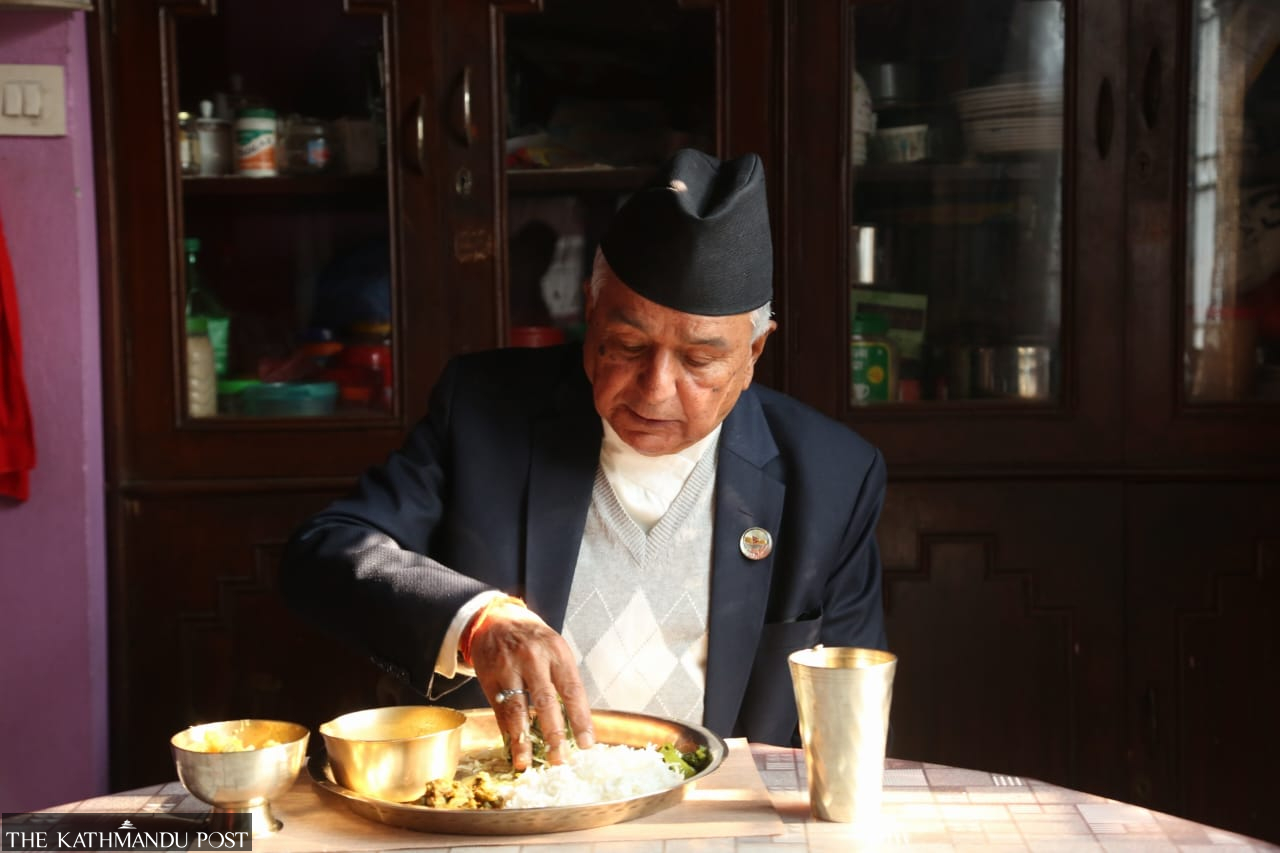
Former Speaker and multiple-time minister, President-elect Paudel has traversed a long political journey to make it to the country’s highest state position.
He spent over a decade in jail. He has, till now, become lawmaker six times, a minister five times, and Speaker for one term.
Paudel was born on October 14, 1944 in Bahunpokhara, present day Byas municipality-8, in Tanahun district as the eldest son to Durga Prasad Poudel and Rishi Maya Poudel. Theirs was a middle-class family that relied on agriculture for livelihood.
Paudel’s father was also a Congress supporter and the family took keen interest in politics.
Ram Chandra was just 16 when he got into politics after King Mahendra in 1960 imprisoned then Congress leader and prime minister BP Koirala.
He also participated in the Congress-led armed struggle against the state in the 1960s. In 1967, a campaigner for the students’ movement, he was elected as president of the student union at the Capital’s Saraswati Campus chapter.
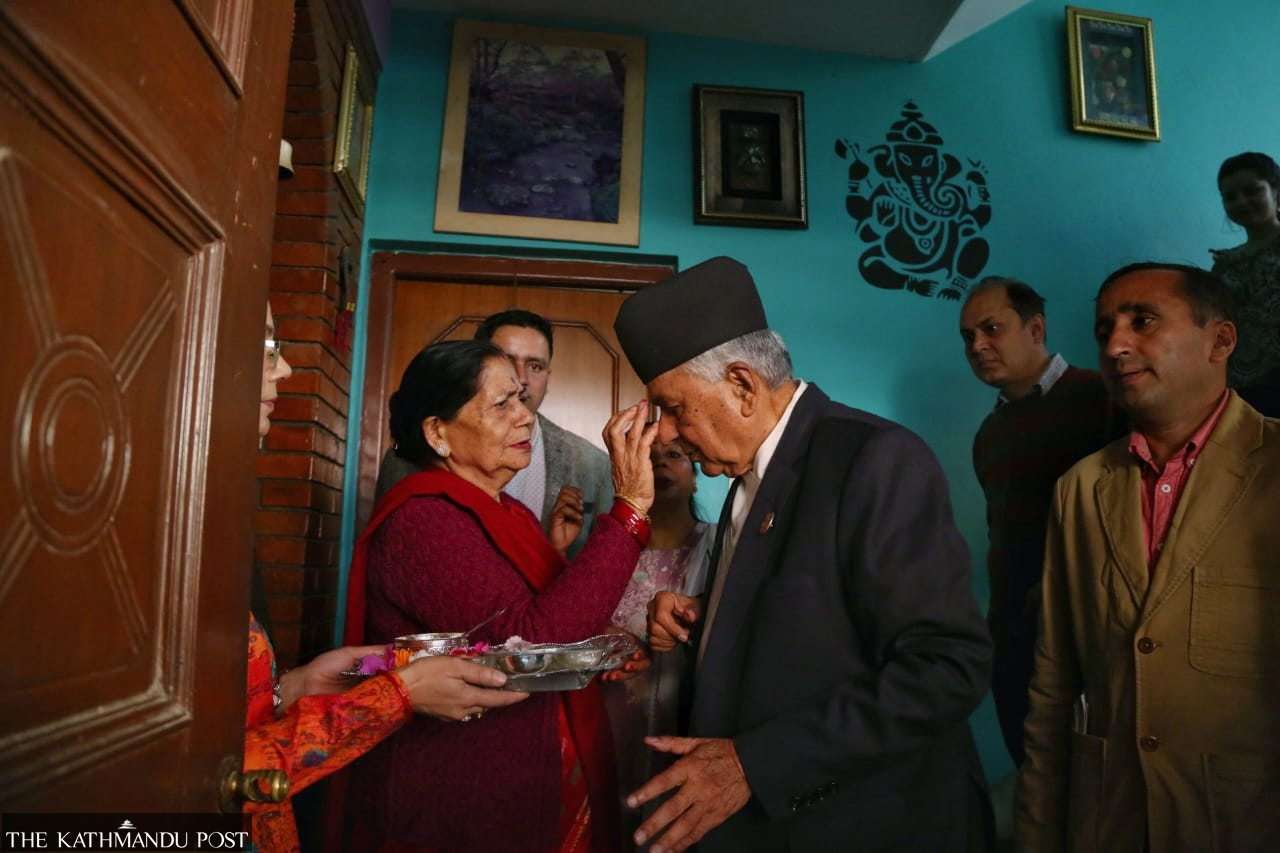
In 1968, he was elected general secretary of the Democratic Socialist Youth League. Poudel is the founding central member of the Nepal Students’ Union, the Congress party’s student wing established in 1970.
Paudel’s journey as a leader of the Nepali Congress began when he became the party’s central working committee member in 1988. In the parliamentary elections held in 1991, a year after the restoration of democracy, Paudel was elected as a member of Parliament from Tanahun-1.
He served as Minister for Local Development in 1991 and became Minister for Local Development and Agriculture in 1994.
Paudel was reelected to the parliament from Tanahun-2 in the midterm elections in 1994. He served as the Speaker of the Parliament from December 18, 1994 to March 23, 1999.
In the 1999 general elections, he was reelected to the Parliament from Tanahun-2. Paudel served as deputy prime minister, along with the portfolios of Home and Communications as well from 1999 to 2002.
In 2006, Paudel was elected Congress general secretary. He also played an important role in the peace process as the coordinator of the Peace Secretariat after the Maoists joined mainstream politics.
In 2007, after the Maoist joined the government, he became Minister for Peace and Reconstruction.
In 2008, Paudel became Nepali Congress vice-president. In the first Constituent Assembly elections held the same year, he was elected as CA member from Tanahun-2.
Likewise, In 2009, he was elected as Congress parliamentary party leader. In the second Constituent Assembly elections 2014, he was elected as Constituent Assembly member from Tanahun-2.
In terms of education, he has an MA in Nepali and Shastri (Bachelor’s in Sanskrit) from the Tribhuvan University.
The Paudel couple (he and his wife Savita Paudel) have five children—four daughters (Sharmila, Sangya, Anugya, and Awagya) and one son (Chintan).
Paudel lost the infamous race for prime ministership 17 times in 2010. The race for prime ministership began in July 2010 with three candidates: Paudel from the Congress, Pushpa Kamal Dahal from the UCPN-Maoist and Jhala Nath Khanal from the UML.
Paudel could not secure a majority even after 16 rounds of voting. In the 17th round, it was not him but UML’s Jhala Nath Khanal who secured the parliamentary majority to become prime minister, after the regulations related to the prime ministerial race were amended.
Paudel was also unlucky in the elections for party president. In March 2016, Sher Bahadur Deuba defeated the then acting president Paudel in the election for the party’s top post, with a wide margin.
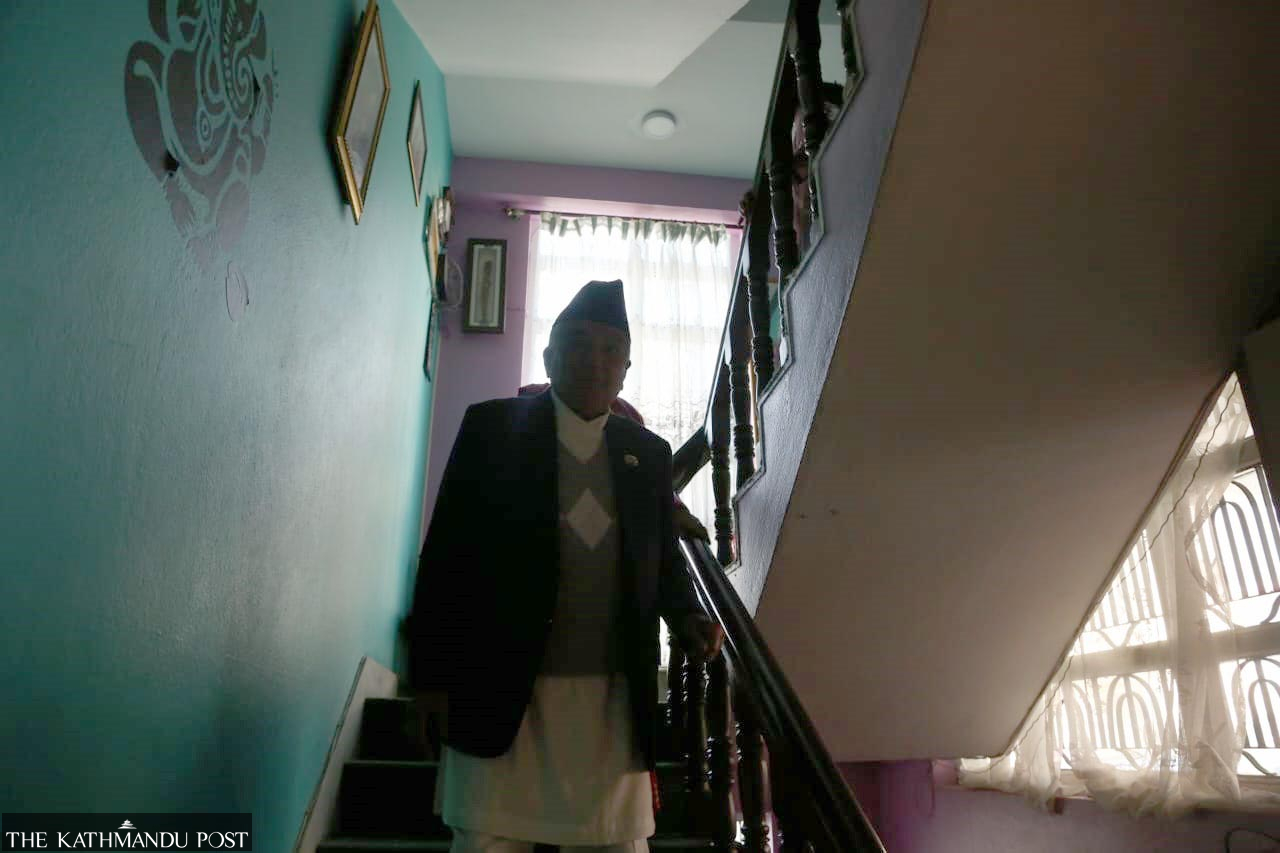
In the 2017 parliamentary elections, Paudel lost to the candidate of the communist alliance Krishna Kumar Shrestha, in constituency Tanahun-1.
But he was again elected to the lower house from Tanahun-1 in last November’s elections.
In the party, Paudel is considered a middle-of-the-roader who had closely worked with party veterans such as Ganesh Man Singh, Krishna Prasad Bhattarai and Girija Prasad Koirala.
His political journey, nonetheless, is not controversy-free. In the 2021 Congress general convention, for instance, on learning that he could no longer be the party president, he decided to support Sher Bahadur Deuba for the post rather than one of the rebel candidates he had earlier backed. Apparently, Deuba had secured his backing after promising to support Paudel’s future bid for the country’s President.
Before that, Paudel was accused of engineering a UML split in 1998.
UML chair KP Sharma Oli, at a gathering at the party central office on Monday, said that Paudel, as a Speaker, had a hand in splitting the UML. “He is the one to start a wrong parliamentary practice,” he said.
In early 1998, a significant number of the UML leaders led by RK Mainali, CP Mainali and Bam Dev Gautam had broken away from their mother party and launched the Communist Party of Nepal–Marxist Lenninist (CPN-ML).




 22.12°C Kathmandu
22.12°C Kathmandu














